Versions of Culture - T Eagleton ‘Culture’ is said to be one of the two or three most complex words in the English language, and the term which is sometimes considered to be its opposite – nature – is commonly awarded the accolade of being the most complex of all. Yet though it is fashionable these days to see nature as a derivative of culture, culture, etymologically speaking, is a concept derived from nature. One of its original meanings is ‘husbandry’, or the tending of natural growth. The same is true of our words for law and justice, as well as of terms like ‘capital’, ‘stock’, ‘pecuniary’ and ‘sterling’. The word ‘coulter’, which is a cognate of ‘culture’, means the blade of a ploughshare. We derive our word for the nest of human activities from labour and agriculture, crops and cultivation. Francis Bacon writes of ‘the culture and manurance of minds’, in a suggestive hesitancy between dung and mental distinction. ‘Culture’ here means an activity, and it was a long time before the word came to denote an entity. Even then, it was probably not until Matthew Arnold that the word dropped such adjectives as ‘moral’ and ‘intellectual’ and came to be just ‘culture’, an abstraction in itself. Etymologically speaking, then, the now-popular phrase ‘cultural materialism’ is something of a tautology. ‘Culture’ at rst denoted a thoroughly material process, which was then metaphorically transposed to a airs of the spirit. The word thus charts within its semantic unfolding humanity’s own historic shift from rural to urban existence, pig-farming to Picasso, tilling the soil to splitting the atom. In Marxist parlance, it brings together both base and superstructure in a single notion. Perhaps behind the pleasure we are supposed to take in ‘cultivated’ people lurks a racememory of drought and famine. But the semantic shift is also paradoxical: it is the urban dwellers who are ‘cultivated’, and those who actually live by tilling the soil who are not. Those who cultivate the land are less able to cultivate themselves. Agriculture leaves no leisure for culture. ffi ff fifi fi The Latin root of the word ‘culture’ is colere, which can mean anything from cultivating and inhabiting to worshipping and protecting. Its meaning as ‘inhabit’ has evolved from the Latin colonus to the contemporary ‘colonialism’, so that titles like Culture and Colonialism are, once again, mildly tautological. But colere also ends up via the Latin cultus as the religious term ‘cult’, just as the idea of culture itself in the modern age comes to substitute itself for a fading sense of divinity and transcendence. Cultural truths – whether high art or the traditions of a people – are sometimes sacred ones, to be protected and revered. Culture, then, inherits the imposing mantle of religious authority, but also has uneasy a nities with occupation and invasion; and it is between these two poles, positive and negative, that the concept is currently pitched. It is one of those rare ideas which have been as integral to the political left as they are vital to the political right, and its social history is thus exceptionally tangled and ambivalent. If the word ‘culture’ traces a momentous historical transition, it also encodes a number of key philosophical issues. Within this single term, questions of freedom and determinism, agency and endurance, change and identity, the given and the created, come dimly into focus. If culture means the active tending of natural growth, then it suggests a dialectic between the arti cial and the natural, what we do to the world

But nature makes that mean; so over that art, Which you say adds to nature, is an art That nature makes ... This is an art Which does mend nature – change it rather, but The art itself is nature. (Act IV, sc. iv) Nature produces culture which changes nature: it is a familiar motif of the so-called Last Comedies, which see culture as the medium of nature’s constant selfrefashioning. If Ariel in The Tempest is all airy agency and Caliban all earthy inertia, a more dialectical interplay of culture and nature can be found in Gonzalo’s description of Ferdinand swimming from the wrecked ship: Sir, he may live; I saw him beat the surges under him, And ride upon their backs; he trod the water, Whose enmity he ung aside, and breasted The surge most swoln that met him; his bold head ’Bove the contentious waves he kept, and oared Himself with his good arms in lusty stroke To th’ shore ... (Act II, sc. i) fl fi ffi fi Swimming is an apt image of the interplay in question, since the swimmer actively creates the current which sustains him, plying the waves so they may return to buoy him up. Thus Ferdinand ‘beats the surges’ only to ‘ride upon their backs’, treads, ings, breasts and oars an ocean which is by no means just pliable material but ‘contentious’, antagonistic, recalcitrant to human shaping. But it is just this resistance which allows him to act upon it. Nature itself produces the means of its own transcendence, rather as the Derridean ‘supplement’ is already contained by whatever it ampli es. As we shall see later, there is something oddly necessary about the gratuitous superabundance we call culture. If nature is always in some sense cultural, then cultures are built out of that ceaseless tra c with nature which we call labour. Cities are raised out of sand, wood, iron, stone, water and the like, and are thus quite as natural as rural idylls are cultural. The geographer David Harvey argues that there is nothing ‘unnatural’ about New York city, and doubts that tribal peoples can be said to be ‘closer to nature’ than the West. The word ‘manufacture’ originally means handicraft, and is thus ‘organic’, but comes over time to denote mechanical mass production, and so picks up a pejorative overtone of arti ce, as in ‘manufacturing divisions where none exist’. fi fl and what the world does to us. It is an epistemologically ‘realist’ notion, since it implies that there is a nature or raw material beyond ourselves; but it also has a ‘constructivist’ dimension, since this raw material must be worked up into humanly signi cant shape. So it is less a matter of deconstructing the opposition between culture and nature than of recognizing that the term ‘culture’ is already such a deconstruction. In a further dialectical turn, the cultural means we use to transform nature are themselves derived from it. The point is made rather more poetically by Polixenes in Shakespeare’s The Winter’s Tale:
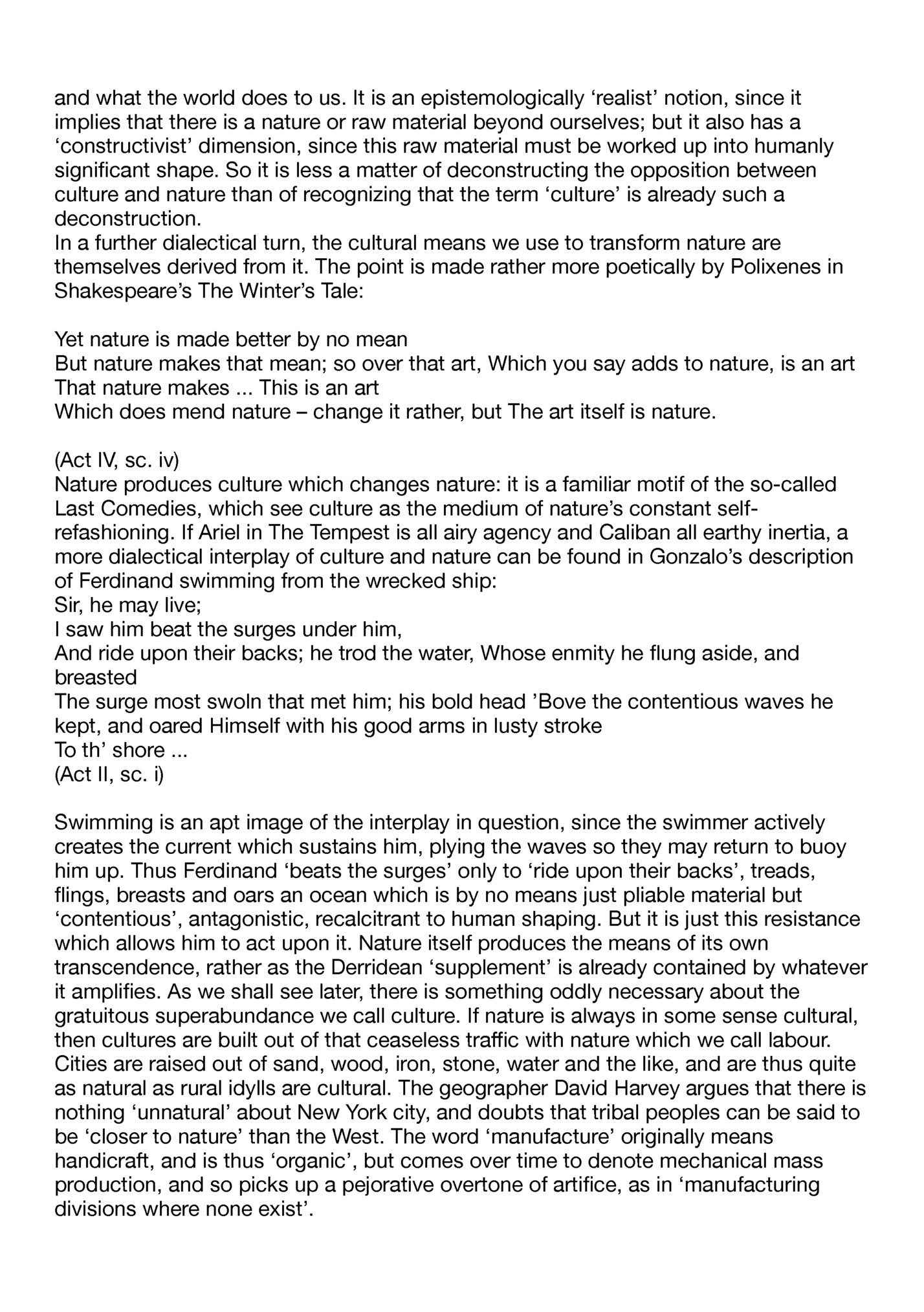
The idea of culture, then, signi es a double refusal: of organic determinism on the one hand, and of the autonomy of spirit on the other. It is a rebu to both naturalism and idealism, insisting against the former that there is that within nature which exceeds and undoes it, and against idealism that even the most high-minded human agency has its humble roots in our biology and natural environment. The fact that culture (like nature in this respect) can be both a descriptive and evaluative term, meaning what has actually evolved as well as what ought to, is relevant to this refusal of both naturalism and idealism. If the concept sets its face against determinism, it is equally wary of voluntarism. Human beings are not mere products of their environs, but neither are those environs sheer clay for their arbitrary self-fashioning. If culture trans gures nature, it is a project to which nature sets rigorous limits. The very word ‘culture’ contains a tension between making and being made, rationality and spontaneity, which upbraids the disembodied intellect of the Enlightenment as much as it de es the cultural reductionism of so much contemporary thought. It even hints towards the political contrast between evolution and revolution – the former ‘organic’ and ‘spontaneous’, the latter arti cial and voulu – and suggests how one might move beyond this stale antithesis too. The word oddly commingles growth and calculation, freedom and necessity, the idea of a conscious project but also of an unplannable surplus. And if this is true of the word, so is it of some of the activities it denotes. When Friedrich Nietzsche looked for a practice which might dismantle the opposition between freedom and determinism, it was to the experience of making art that he turned, which for the artist feels not only free and necessary, creative and constrained, but each of these in terms of the other, and so appears to press these rather tattered old polarities to the point of undecidability. fffi ff ff fi ff fi fi fi There is another sense in which culture as a word faces both ways. For it can also suggest a division within ourselves, between that part of us which cultivates and re nes, and whatever within us constitutes the raw material for such re nement. Once culture is grasped as self-culture, it posits a duality between higher and lower faculties, will and desire, reason and passion, which it then instantly o ers to overcome. Nature now is not just the stu of the world, but the dangerously appetitive fi fi If culture originally means husbandry, it suggests both regulation and spontaneous growth. The cultural is what we can change, but the stu to be altered has its own autonomous existence, which then lends it something of the recalcitrance of nature. But culture is also a matter of following rules, and this too involves an interplay of the regulated and unregulated. To follow a rule is not like obeying a physical law, since it involves a creative application of the rule in question. 2–4–6–8–10–30 may well represent a rule-bound sequence, just not the rule one most expects. And there can be no rules for applying rules, under pain of in nite regress. Without such openendedness, rules would not be rules, rather as words would not be words; but this does not mean that any move whatsoever can count as following a rule. Rulefollowing is a matter neither of anarchy nor autocracy. Rules, like cultures, are neither sheerly random nor rigidly determined – which is to say that both involve the idea of freedom. Someone who was entirely absolved from cultural conventions would be no more free than someone who was their slave.
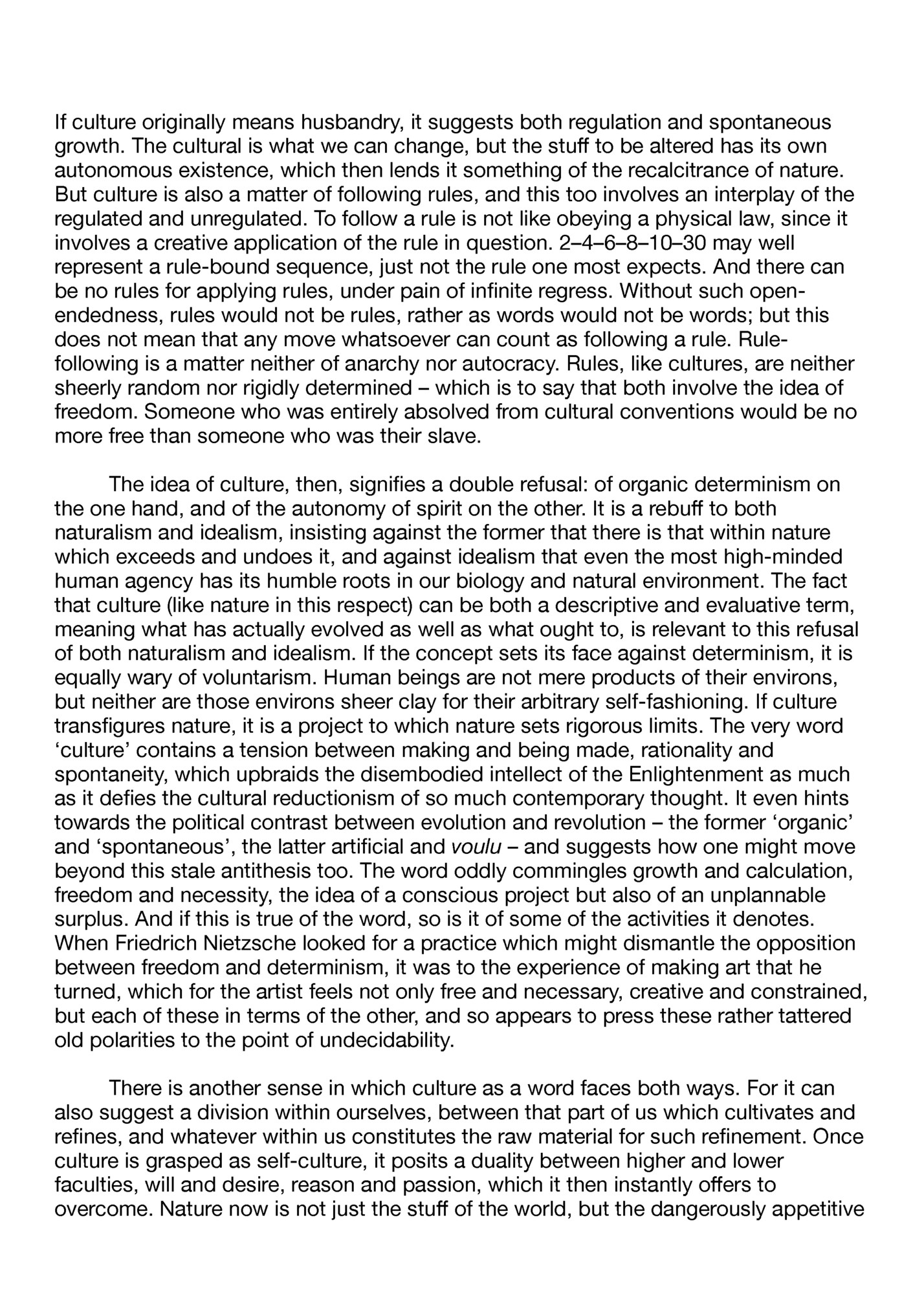
and the disruptive drives within can easily be equated with anarchic forces without. Culture is thus a matter of self-overcoming as much as self-realization. If it celebrates the self, it also disciplines it, aesthetic and ascetic together. Human nature is not quite the same as a eld of beetroot, but like a eld it needs to be cultivated – so that as the word ‘culture’ shifts us from the natural to the spiritual, it also intimates an a nity between them. If we are cultural beings, we are also part of the nature on which we go to work. Indeed it is part of the point of the word ‘nature’ to remind us of the continuum between ourselves and our surroundings, just as the word ‘culture’ serves to highlight the di erence. In this process of self-shaping, action and passivity, the strenuously willed and the sheerly given, unite once more, this time in the same individuals. We resemble nature in that we, like it, are to be cu ed into shape, but we di er from it in that we can do this to ourselves, thus introducing into the world a degree of self-re exivity to which the rest of nature cannot aspire. As self-cultivators, we are clay in our own hands, at once redeemer and unregenerate, priest and sinner in the same body. Left to its own devices, our reprobate nature will not spontaneously rise to the grace of culture; but neither can such grace be rudely forced upon it. It must rather cooperate with the innate tendencies of nature itself, in order to induce it to transcend itself. Like grace, culture must already represent a potential within human nature, if it is to stick. But the very need for culture suggests that there is something lacking in nature – that our capacity to rise to heights beyond those of our fellow natural creatures is necessary because our natural condition is also a good deal more ‘unnatural’ than that of our fellows. If there is a history and a politics concealed in the word ‘culture’, there is also a theology. ffi fl fl fi ff fi fifi fffl fi ff fi ff Cultivation, however, may not only be something we do to ourselves. It may also be something done to us, not least by the political state. For the state to ourish, it must inculcate in its citizens the proper sorts of spiritual disposition; and it is this which the idea of culture or Bildung signi es in a venerable tradition from Schiller to Matthew Arnold.2 In civil society, individuals live in a state of chronic antagonism, driven by opposing interests; but the state is that transcendent realm in which these divisions can be harmoniously reconciled. For this to happen, however, the state must already have been at work in civil society, soothing its rancour and re ning its sensibilities; and this process is what we know as culture. Culture is a kind of ethical pedagogy which will t us for political citizenship by liberating the ideal or collective self buried within each of us, a self which nds supreme representation in the universal realm of the state. Coleridge writes accordingly of the need to ground civilization in cultivation, ‘in the harmonious development of those qualities and faculties that characterise our humanity. We must be men in order to be citizens’. The state incarnates culture, which in turn embodies our common humanity. To elevate culture over politics – to be men rst and citizens later – means that politics must move within a deeper ethical dimension, drawing on the resources of Bildung and forming individuals into suitably well-tempered, responsible citizens. This is the rhetoric of the civics class, if a little more highly pitched. But since ‘humanity’ here means a community free of con ict, what is at stake is not just the priority of
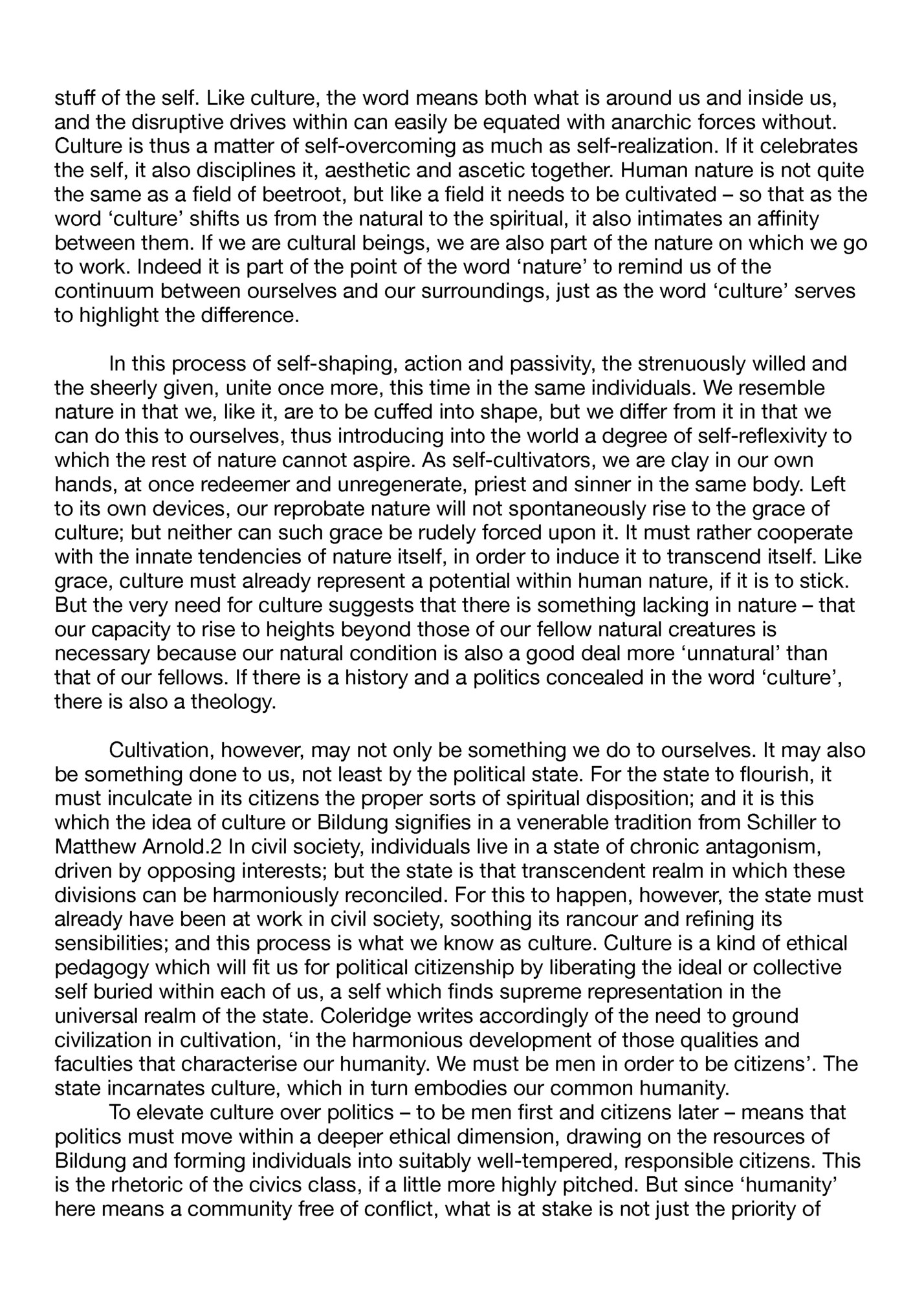
What culture does, then, is distil our common humanity from our sectarian political selves, redeeming the spirit from the senses, wresting the changeless from the temporal, and plucking unity from diversity. It signi es a kind of self-division as well as a self-healing, by which our fractious, sublunary selves are not abolished, but re ned from within by a more ideal sort of humanity. The rift between state and civil society – between how the bourgeois citizen would like to represent himself and how he actually is – is preserved but also eroded. Culture is a form of universal subjectivity at work within each of us, just as the state is the presence of the universal within the particularist realm of civil society. As Friedrich Schiller puts it in his Letters on the Aesthetic Education of Man (1795): Every individual human being, one may say, carries within him, potentially and prescriptively, an ideal man, the archetype of a human being, and it is his life’s task to be, through all his changing manifestations, in harmony with the unchanging unity of this ideal. This archetype, which is to be discerned more or less clearly in every individual, is represented by the State, the objective and, as it were, canonical form in which all the diversity of individual subjects strives to unite. fi In this tradition of thought, then, culture is neither dissociated from society nor wholly at one with it. If it is a critique of social life at one level, it is complicit with it at another. It has not yet set its face entirely against the actual, as it will as the English ‘Culture and Society’ lineage gradually unfurls. Indeed culture for Schiller is the very mechanism of what will later be called ‘hegemony’, moulding human subjects to the needs of a new kind of polity, remodelling them from the ground up into the docile, moderate, high-minded, peace-loving, uncontentious, disinterested agents of that political order. But to do this, culture must also act as a kind of immanent critique or deconstruction, occupying an unregenerate society from within to break down its resistance to the motions of the spirit. Later in the modern age, culture will become either Olympian wisdom or ideological weapon, a secluded form of social critique or a process locked all too deeply into the status quo. Here, at an earlier, more buoyant moment of that history, it is still possible to see culture as at once an ideal criticism and a real social force. Raymond Williams has traced something of the complex history of the word ‘culture’, distinguishing three major modern senses of the word. From its etymological fi fi culture over politics, but over a particular kind of politics. Culture, or the state, are a sort of premature utopia, abolishing struggle at an imaginary level so that they need not resolve it at a political one. Nothing could be less politically innocent than a denigration of politics in the name of the human. Those who proclaim the need for a period of ethical incubation to prepare men and women for political citizenship include those who deny colonial peoples the right to self-government until they are ‘civilized’ enough to exercise it responsibly. They overlook the fact that by far the best preparation of political independence is political independence. Ironically, then, a case which moves from humanity to culture to politics betrays by its own political bias the fact that the real movement is the other way – that it is political interests which usually govern cultural ones, and in doing so de ne a particular version of humanity.
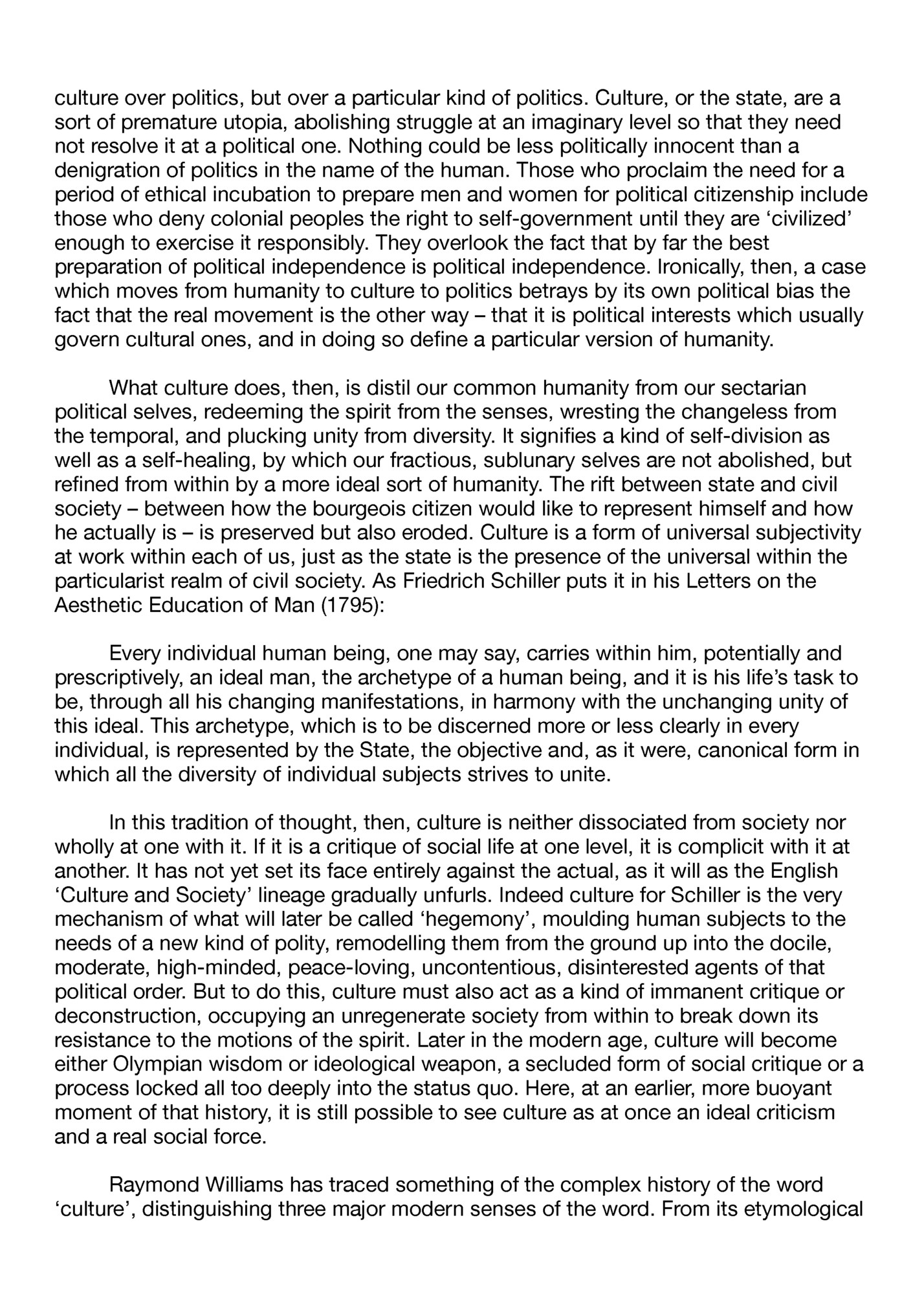
the eighteenth century becomes more or less synonymous with ‘civilization’, in the sense of a general process of intellectual, spiritual and material progress. As an idea, civilization signi cantly equates manners and morals: to be civilized includes not spitting on the carpet as well as not decapitating one’s prisoners of war. The very word implies a dubious correlation between mannerly conduct and ethical behaviour, which in England can also be found in the word ‘gentleman’. As a synonym of ‘civilization’, ‘culture’ belonged to the general spirit of Enlightenment, with its cult of secular, progressive self-development. Civilization was largely a French notion – then as now, the French were thought to have a monopoly on being civilized – and named both the gradual process of social re nement and the utopian telos towards which it was unfolding. But whereas the French ‘civilization’ typically included political, economic and technical life, the German ‘culture’ had a more narrowly religious, artistic and intellectual reference. It could also mean the intellectual re nement of a group or individual, rather than of society as a whole. ‘Civilization’ played down national di erences, whereas ‘culture’ highlighted them. The tension between ‘culture’ and ‘civilization’ had much to do with the rivalry between Germany and France. Three things then happen to the notion around the turn of the nineteenth century. For one thing, it begins to veer from being a synonym of ‘civilization’ towards being its antonym. This is a rare enough semantic swerve, and one which captures a momentous historical one. Like ‘culture’, ‘civilization’ is part-descriptive, partnormative: it can either neutrally designate a form of life (‘Inca civilization’), or implicitly commend a life-form for its humanity, enlightenment and re nement. The adjectival form ‘civilized’ does this most obviously today. If civilization means the arts, urban living, civic politics, complex technologies and the like, and if this is considered an advance upon what went before, then ‘civilization’ is inseparably descriptive and normative. It means life as we know it, but also suggests that it is superior to barbarism. And if civilization is not only a stage of development in itself, but one which is constantly evolving within itself, then the word once more uni es fact and value. Any existing state of a airs implies a value-judgement, since it must logically be an improvement on what went before. Whatever is is not only right, but a great deal better than what was. fifi fi fi fifi ffi ff fl fi ff The trouble begins when the descriptive and normative aspects of the word ‘civilization’ start to y apart. The term really belongs to the lexicon of a pre-industrial European middle class, redolent as it is of manners, re nement, politesse, an elegant ease of intercourse. It is thus both personal and social: cultivation is a matter of the harmonious, all-round development of the personality, but nobody can do this in isolation. Indeed it is the dawning recognition that they cannot which helps to shift culture from its individual to its social meaning. Culture requires certain social conditions; and since these conditions may involve the state, it can have a political dimension too. Cultivation goes hand in hand with commerce, since it is commerce which breaks down rural churlishness, brings men into complex relationship and thus polishes their rough edges. But the industrial-capitalist inheritors of this sanguine age would have rather more di culty in persuading themselves that civilization as fact was at one with civilization as value. It is a fact of early industrial-capitalist civilization that
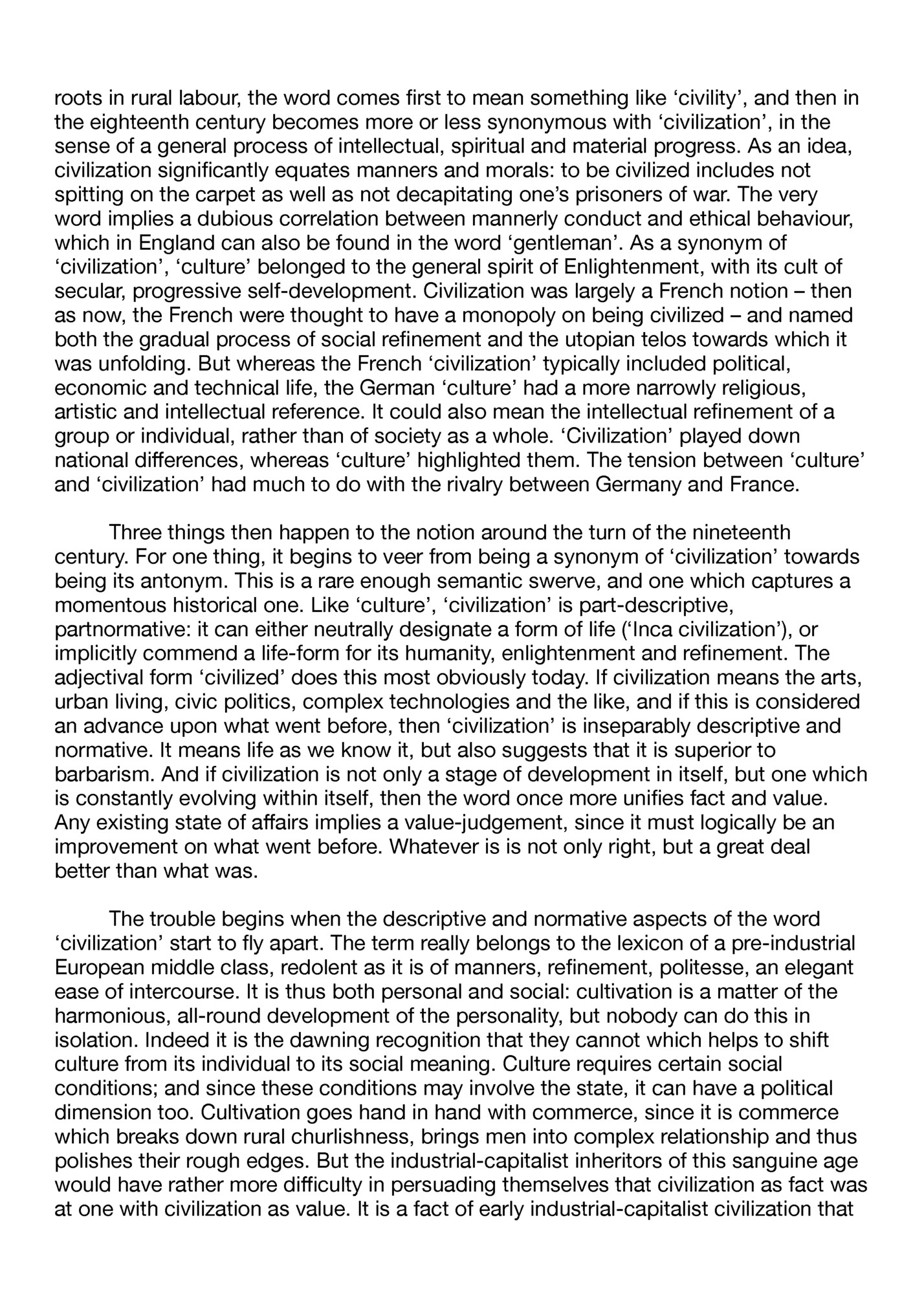
Meanwhile, by the end of the nineteenth century, ‘civilization’ had also acquired an inescapably imperialist echo, which was enough to discredit it in the eyes of some liberals. Another word was accordingly needed to denote how social life should be rather than how it was, and the Germans borrowed the French culture for the purpose. Kultur or Culture thus became the name of the Romantic, pre-Marxist critique of early industrial capitalism. Whereas civilization is a sociable term, a matter of genial wit and agreeable manners, culture is an altogether more portentous a air, spiritual, critical and high-minded rather than cheerfully at ease with the world. If the former is formulaically French, the latter is stereotypically German. The more actual civilization appears predatory and debased, the more the idea of culture is forced into a critical attitude. Kulturkritik is at war with civilization rather than at one with it. If culture was once seen as allied with commerce, the two are now increasingly at odds. As Raymond Williams puts it, ‘A word which had indicated a process of training within a more assured society became in the nineteenth century the focus of a deeply signi cant response to a society in the throes of a radical and painful change’. One reason for the emergence of ‘culture’, then, is the fact that ‘civilization’ was beginning to ring less and less plausible as a value-term. So it is that the turn of the nineteenth century witnesses a growing Kulturpessimismus, of which perhaps the major document is Oswald Spengler’s Decline of the West, but which nds its minor English resonance in F.R. Leavis’s signi cantly entitled Mass Civilisation and Minority Culture. The copula of the title marks, needless to say, a glaring contrast. fl ff fi fi fiff If culture is to be an e ective critique, however, it must retain its social dimension. It cannot simply lapse back into its earlier sense of individual cultivation. Coleridge’s celebrated antithesis in On the Constitution of Church and State – ‘The permanent distinction and the occasional contrast between cultivation and civilisation’ – foreshadows much of the destiny of the word over the decades which were to follow. Born at the heart of the Enlightenment, the concept of culture now struck with Oedipal ferocity against its progenitors. Civilization was abstract, alienated, fragmented, mechanistic, utilitarian, in thrall to a crass faith in material progress; culture was holistic, organic, sensuous, autotelic, recollective. The con ict between culture and civilization thus belonged to a full-blown quarrel between tradition and modernity. But it was also to some extent a phoney war. The opposite of culture, for Matthew Arnold and his disciples, was an anarchy which was engendered by civilization itself. A grossly materialist society would breed its raw, resentful wreckers. But in re ning these rebels, culture would nd itself riding to the rescue of the very civilization for which it felt such disdain. Though the political wires between the two concepts were thus notoriously crossed, civilization was on the whole bourgeois, while culture was both patrician and populist. Like Lord Byron, it represented in the main a radical brand of aristocratism, with a heartfelt sympathy for the Volk and a supercilious distaste for the Burgher. fi fi young chimney sweeps tended to develop cancer of the scrotum, but it is hard to see it as a cultural achievement on a level with the Waverley novels or Rheims cathedral.
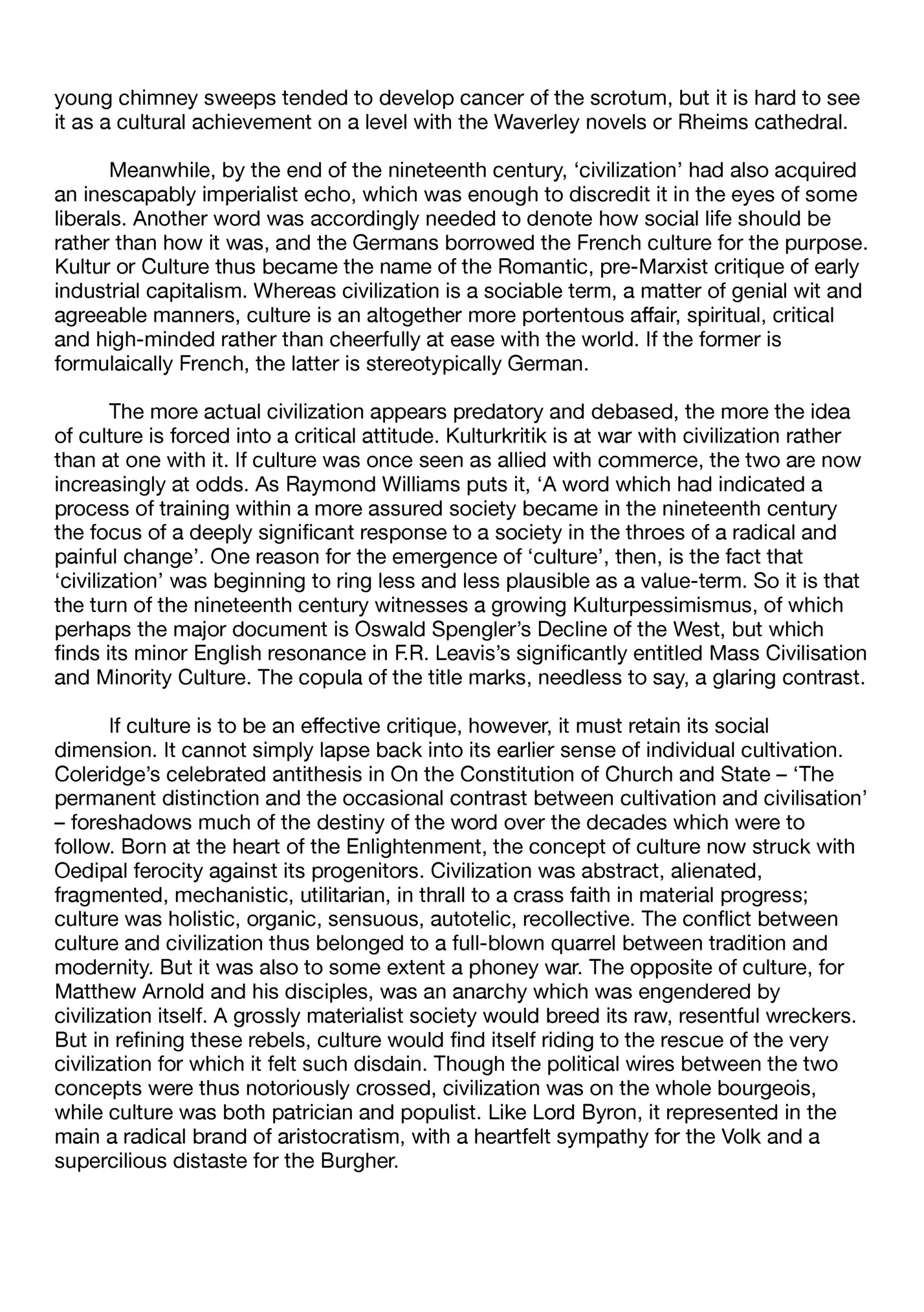
This volkisch turn of the concept is the second strand of development Williams traces. From the German Idealists onwards, culture comes to assume something of its modern meaning of a distinctive way of life. For Herder, this is a conscious assault on the universalism of the Enlightenment. Culture, he insists, means not some grand, unilinear narrative of universal humanity, but a diversity of speci c life-forms, each with its own peculiar laws of evolution. In fact, as Robert Young points out, the Enlightenment was by no means uniformly opposed to this view. It could be open to non-European cultures in ways which perilously relativized its own values, and some of its thinkers pre gured the later idealizing of the ‘primitive’ as a critique of the West.8 But Herder explicitly links the struggle between the two senses of the word ‘culture’ to a con ict between Europe and its colonial Others. He is out to oppose the Eurocentrism of culture-as-universal-civilization with the claims of those ‘of all the quarters of the globe’ who have not lived and perished for the dubious honour of having their posterity made happy by a speciously superior European culture. ‘What one nation holds indispensable to the circle of its thoughts’, Herder writes, ‘has never entered into the mind of a second, and by a third has been deemed injurious’. The origin of the idea of culture as a distinctive way of life, then, is closely bound up with a Romantic anti-colonialist penchant for suppressed ‘exotic’ societies. The exoticism will resurface in the twentieth century in the primitivist features of modernism, a primitivism which goes hand-in-hand with the growth of modern cultural anthropology. It will crop up rather later, this time in postmodern guise, in a romanticizing of popular culture, which now plays the expressive, spontaneous, quasiutopian role which ‘primitive’ cultures had played previously. fi fi fi ff fi fi fl In a gesture pre gurative of postmodernism, itself inter alia a vein of late Romantic thought, Herder proposes to pluralize the term ‘culture’, speaking as he does of the cultures of di erent nations and periods, as well as of distinct social and economic cultures within the nation itself. It is this sense of the word which will tentatively take root around the mid-nineteenth century, but which will not establish itself decisively until the beginning of the twentieth. Though the words ‘civilization’ and ‘culture’ go on being used interchangeably, not least by anthropologists, culture is now also almost the opposite of civility. It is tribal rather than cosmopolitan, a reality lived on the pulses at a level far deeper than the mind, and thus closed to rational criticism. Ironically, it is now a way of describing the life-forms of ‘savages’ rather than a term for the civilized.12 In a curious reversal, savages are cultured but the civilized are not. But if ‘culture’ can describe a ‘primitive’ social order, it can also provide a way of idealizing one’s own. For the radical Romantics, ‘organic’ culture could furnish a critique of actual society; for a thinker like Edmund Burke, it could provide a metaphor for actual society, and so shield it from such criticism. The unity some could nd only in pre-modern communities could also be claimed of imperial Britain. Modern states could thus plunder pre-modern ones for ideological purposes as well as for economic ones. Culture is in this sense ‘a word strictly improper, divided against itself ... both synonymous with the mainstream of Western civilisation and antithetical to it’. As a free play of disinterested thought, it can undermine sel sh social interests; but since it undermines them in the name of the social whole, it reinforces the very social order it takes to task.

Culture as organic, like culture as civility, hovers indecisively between fact and value. In one sense, it does no more than designate a traditional form of life, whether of Berbers or barbers. But since community, tradition, rootedness and solidarity are notions we are supposed to approve of, at least until postmodernism happened along, there might be thought to be something a rmative in the sheer existence of such a life-form. Or, better, in the sheer fact of a plurality of such forms. It is this fusion of descriptive and normative, retained from both ‘civilization’ and the universalist sense of ‘culture’, which will rear its head in our own time in the guise of cultural relativism. Such ‘postmodern’ relativism derives, ironically, from just such ambiguities in the epoch of modernity itself. For the Romantics, there is something intrinsically precious about a whole way of life, not least if ‘civilization’ is busy disrupting it. Such ‘wholeness’ is no doubt a myth: anthropologists have taught us how ‘the most heterogeneous habits, thoughts and actions may lie side by side’ in the most apparently ‘primitive’ of cultures, but the more rhapsodically minded have been conveniently deaf to this caveat. Whereas culture as civilization is rigorously discriminating, culture as way of life is not. What is good is whatever springs authentically from the people, whoever they may be. The case works rather better if you are thinking of, say, people like the Navajo rather than people like the Alabama Mothers for Moral Purity, but this was a distinction which was rapidly lost. Culture as civilization had borrowed its distinctions between high and low from early anthropology, for which some cultures were plainly superior to others; but as the debates unfolded, the anthropological sense of the word became more descriptive than evaluative. Simply being a culture of some kind was a value in itself; but it would no more make sense to elevate one such culture over another than to claim that the grammar of Catalan was superior to that of Arabic. For the postmodernist, by contrast, whole ways of life are to be celebrated when they are those of dissident or minority groups, but to be castigated when they are those of majorities. Postmodern ‘identity politics’ thus include lesbianism but not nationalism, which for earlier Romantic radicals, as opposed to later postmodern ones, would be a wholly illogical move. The former camp, living through an era of political revolution, were protected from the absurdity of believing that majority movements or consensuses are invariably benighted. The latter camp, ourishing at a later, less euphoric phase of the same history, has abandoned a belief in radical mass movements, having precious few of them to remember. As a theory, postmodernism comes after the great mid-twentieth-century national liberation movements, and is either literally or metaphorically too young to recollect such seismic political upheavals. Indeed the very term ‘post-colonialism’ means a concern with ‘Third World’ societies which have already lived through their anti-colonial struggles, and which are thus unlikely to prove an embarrassment to those Western theorists who are fond of the underdog but distinctly more sceptical about such concepts as political revolution. It is also, perhaps, rather easier to feel solidarity with ‘Third World’ nations which are not currently in the business of killing one’s compatriots. fl ffi To pluralize the concept of culture is not easily compatible with retaining its positive charge. It is simple enough to feel enthusiastic about culture as humanistic
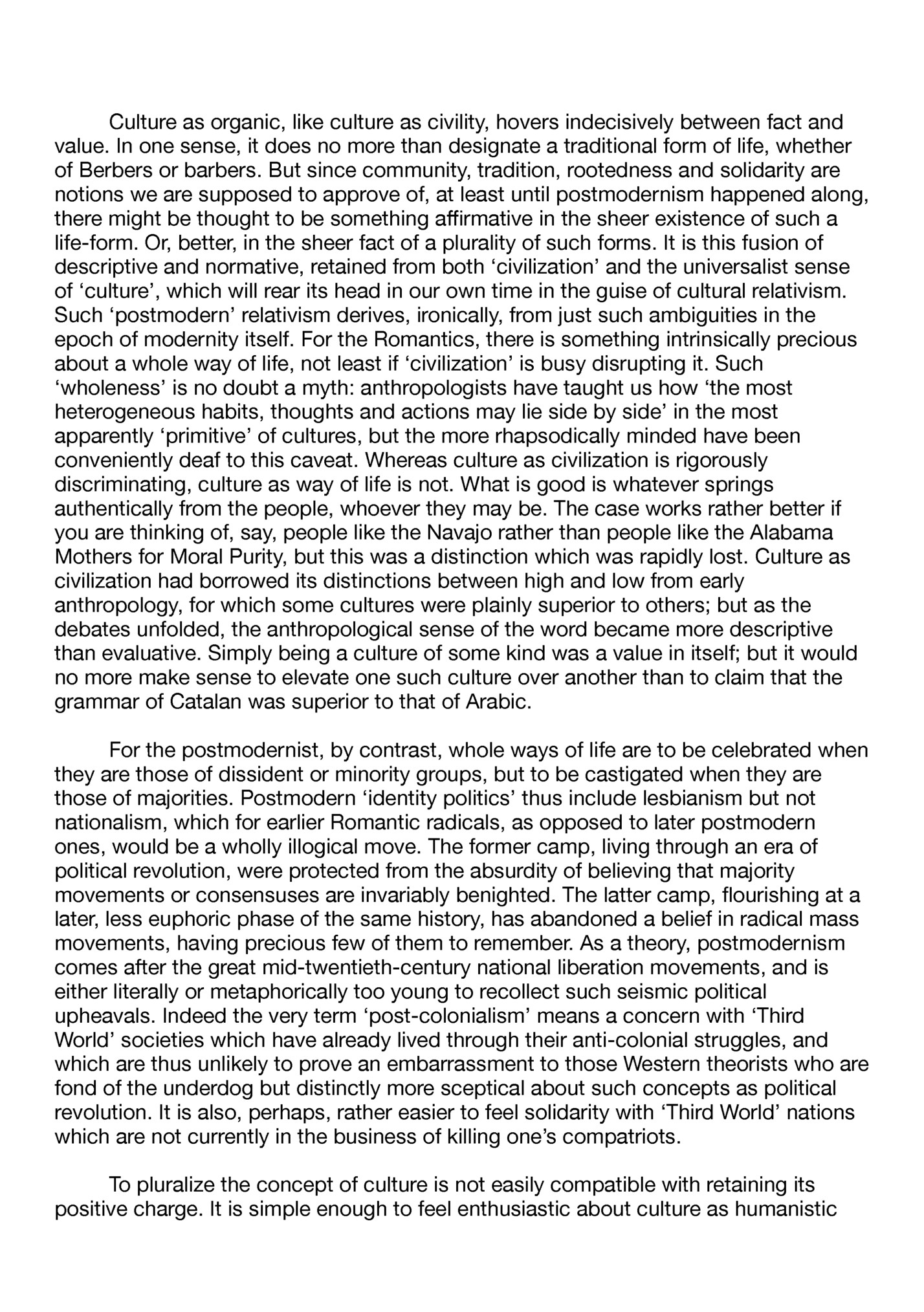
Fleepit Digital © 2021